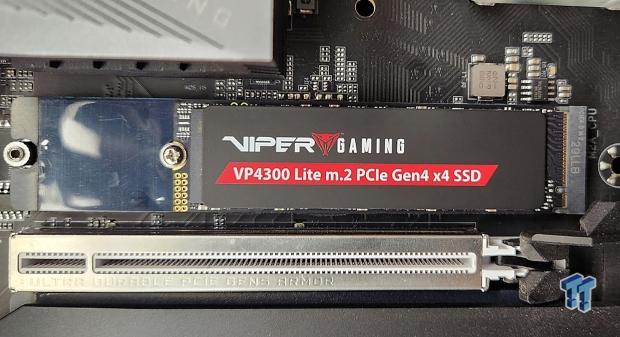
The Bottom Line
Pros
- + Gaming
- + Sequential throughput
- + Pricing
Cons
- - None
Should you buy it?
AvoidConsiderShortlistBuyIntroduction & Drive Details
Patriot's latest SSD represents the third such SSD of its kind we've tested to date. Back in January of this year, we got our first taste of an all Chinese-made DRAMless SSD via the Biwin built Acer Predator GM7 1TB. Then in mid-July of this year, we got our second taste of this hardware configuration via Netac's NV7000-t 1TB.
This particular 100% Chinese-made hardware configuration has been able to forge ahead into territory where no DRAMless SSD has gone before being the first of its kind capable of fully saturating the PCIe Gen4 x4 interface, delivering up to 7,450MB/s throughput. Additionally, it is the very first, and still only, DRAMless SSD capable of delivering sufficient throughput to qualify for use as PlayStation 5 M.2 storage expansion. Unprecedented.
So here we are today with Patriot's take on the very same hardware configuration: a Maxio Tech MAP1602-C 4-channel DRAMless controller in front of a 2TB YMTC 2,400 MT, 232-Layer TLC flash array. Now, what makes this review different from the previous two is capacity. Today's contender is our first go with this hardware configuration at 2TB. We believe that the 2TB capacity point is the new sweet spot for most consumers that game, so we are delighted at the opportunity to see what kind of performance this high-capacity value-drive can deliver.
Patriot's Viper VP4300 Lite, not to be confused with its predecessor, the Viper VP4300, and just is the case for the Predator GM7 and the NV7000-t, the VP4300 Lite turns out to be the best-performing SSD the memory company has ever offered. Incredible really, that a DRAMless 4-channel power-sipping SSD is its most performant offering.
Okay, now let's find out if this hardware configuration at 2TB delivers the goods as well as it does at 1TB. This is a real question, as up to this point, most DRAMless SSDs have proven to be significantly less performant at 2TB than at 1TB.
Drive Details
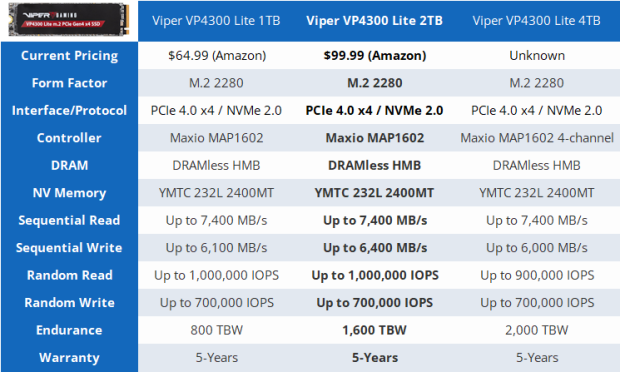
Pricing of 5 cents per gigabyte at the 2TB capacity point is exceptional for a TLC SSD. There will soon be a 4TB variant which could potentially be an even better bargain. The endurance rating and warranty period are very good as well.
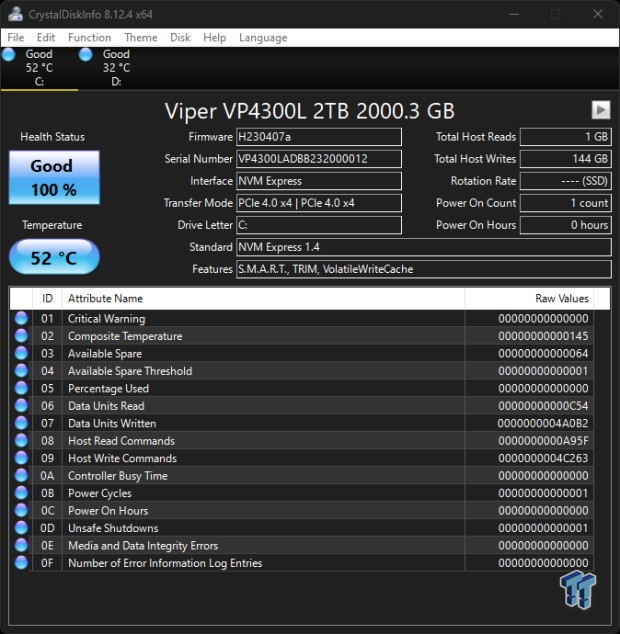
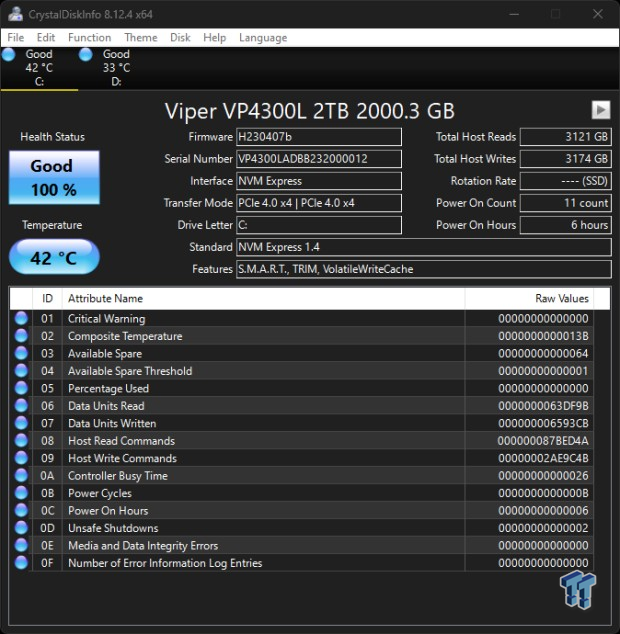
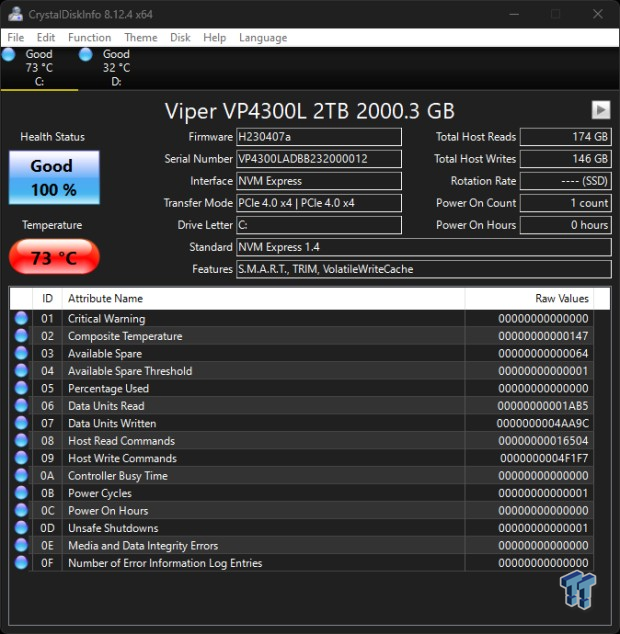
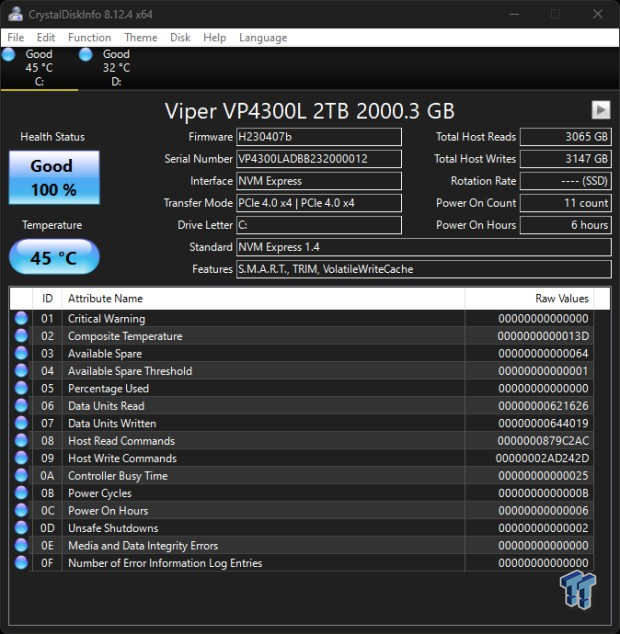
When we first got our hands-on Patriot's newest, we immediately noticed an issue where the drive was reporting temperatures incorrectly. Wildly incorrectly, as a matter of fact. This is a very low-power piece of hardware, DRAMless, and 4-channel, so yeah, there is no way it's getting overly hot. We contacted Patriot, and they immediately verified our finding that there was indeed a bug in the firmware, causing temperatures to be reported inaccurately.
Long story short, Patriot and Maxio Tech (the controller maker) fixed, updated, and validated new firmware, so now temperatures are being accurately reported as physically verified by thermal probe and heat gun. So what we have above are temps before and after the firmware update, both under load and idling. With the original firmware, idle read 52c, now 42c with the updated firmware. With the original firmware, load temps read 73c, now 45c with the updated firmware.
There are a few drives out there that were sold with the older firmware, and Patriot will have the updated firmware available on its website in the coming days for those early buyers that want to update the firmware. If you do update, fine. If you don't, fine as well, because the real temperatures are the same either way. Going forward, all VP4300 Lite SSDs will come with updated firmware preinstalled.
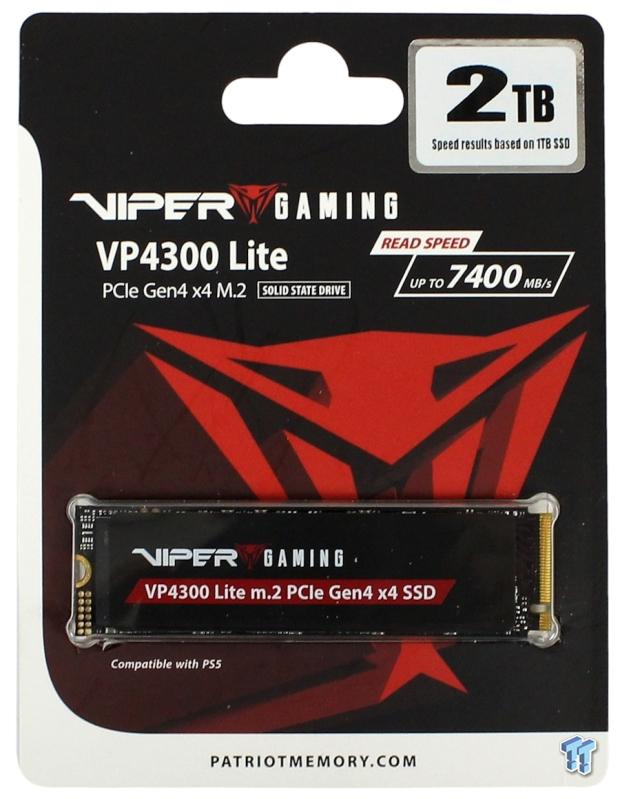
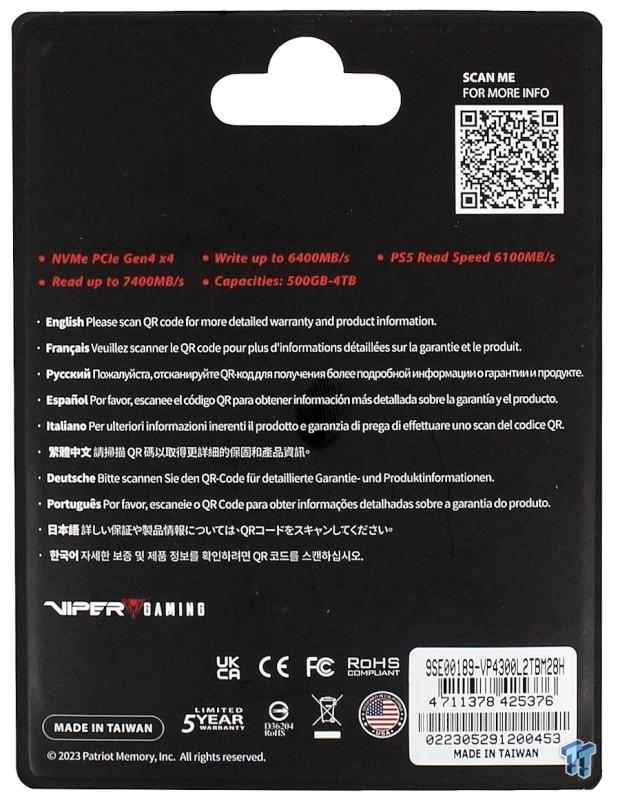


The drive is a preferred single-sided design, the first of its kind for a 2TB Patriot offering. We love that. We will also point out that the controller side label is not your ordinary label, but rather it is a special edition ultra-thin cooling heat spreader.
Jon's Test System Specifications
Intel Test System
- Motherboard: GIGABYTE Z790 AORUS Tachyon
- CPU: Intel Core i9-13900KS - Buy from Amazon
- Cooler: Alphacool Eissturm Hurricane Copper 45 - Buy from Amazon
- RAM: Sabrent Rocket DDR5 32GB - Buy from Amazon
- Graphics Card: MSI SUPRIM X RTX 3080 12GB - Buy from Amazon
- Case: PrimoChill's Praxis Wetbench - Buy from Amazon
- Power Supply: be quiet! Dark Power Pro 12 1200W - Buy from Amazon
- OS: Microsoft Windows 11 Pro 64-bit - Buy from Amazon
AMD Test System
- Motherboard: GIGABYTE B650E AORUS Tachyon
- CPU: AMD Ryzen 9 7950X - Buy from Amazon
- Cooler: Alphacool Eissturm Hurricane Copper 45 - Buy from Amazon
- RAM: Sabrent Rocket DDR5 32GB - Buy from Amazon
- Graphics Card: MSI SUPRIM X RTX 3080 12GB - Buy from Amazon
- Case: PrimoChill's Praxis Wetbench - Buy from Amazon
- Power Supply: be quiet! Dark Power Pro 12 1200W - Buy from Amazon
- OS: Microsoft Windows 11 Pro 64-bit - Buy from Amazon
Because we at TweakTown like to be first at everything whenever we can, we will present our storage performance results for the test subject on both 13th Gen Intel and 7000 Series AMD platforms going forward for the foreseeable future. Because Intel still delivers the best real-world storage performance, (Look Here), our running chart will continue to be Intel-based until AMD can deliver better real-world storage performance than its rival.

Sony PlayStation 5 - M.2 Storage Expansion
PS5 Read Performance
With Sony's wildly popular PlayStation 5 console now enabled for M.2 NVMe SSDs to be used as fast storage expansion, we include results for PS5 compatible SSDs we test as a part of our reviews going forward.
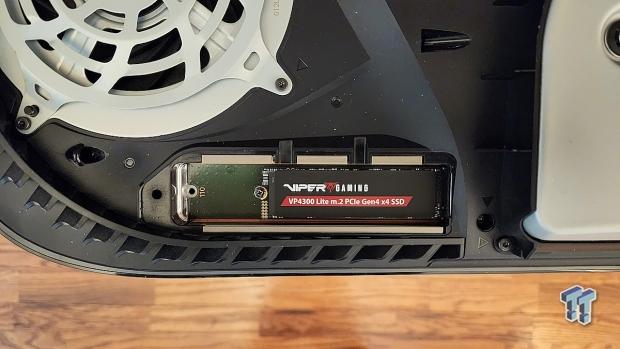
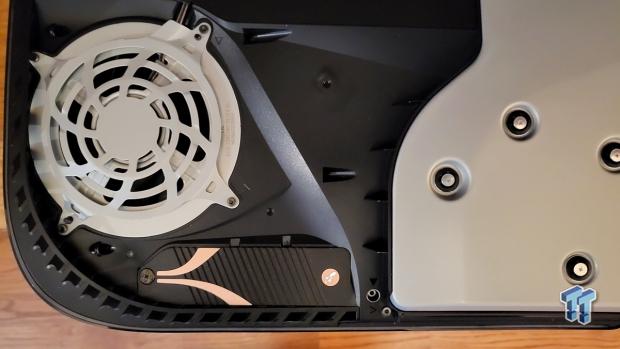
For 5,500 MB/s plus capable SSDs that don't have an adequately sized PS5 compatible heatsink or other SSDs where the heatsink provided doesn't fit right and can be removed, we both use and recommend Sabrents unparalleled PS5 heatsink available here.
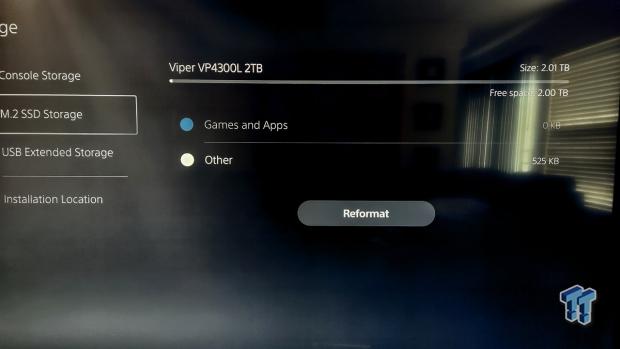
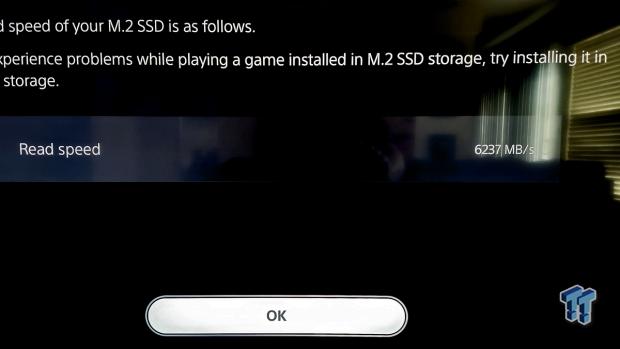
We only chart SSDs that can deliver a minimum of 5,500 MB/s read, which is Sony's original recommendation.
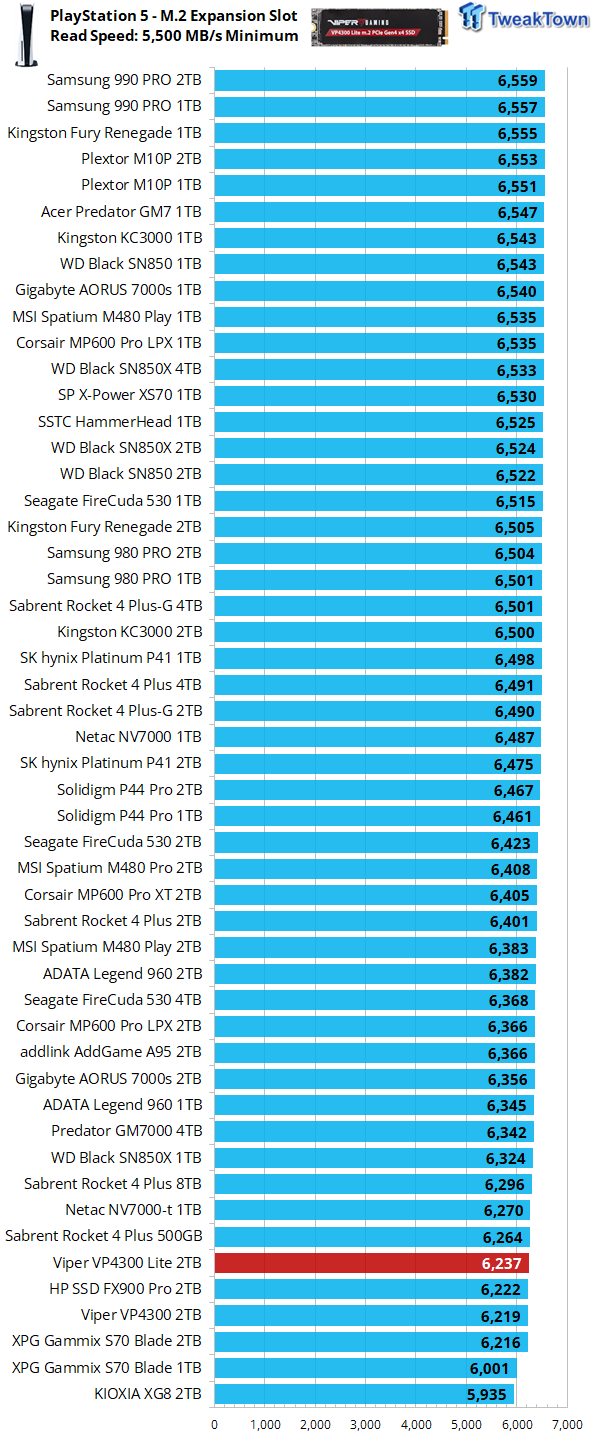
At over 6,200 MB/s, the VP4300 Lite 2TB makes for excellent PS5 M.2 storage expansion.
Synthetic Benchmarks: CDM, Anvil, ATTO
CrystalDiskMark
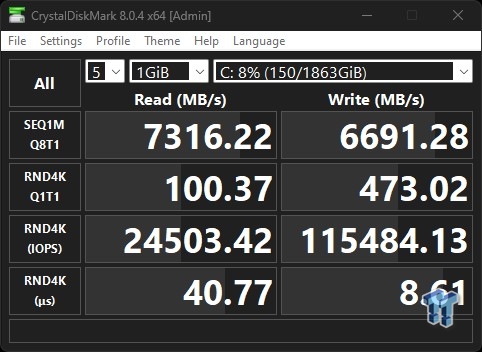
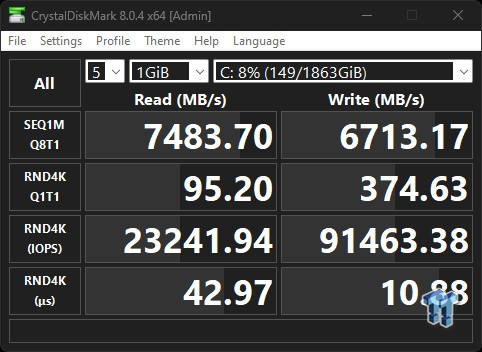
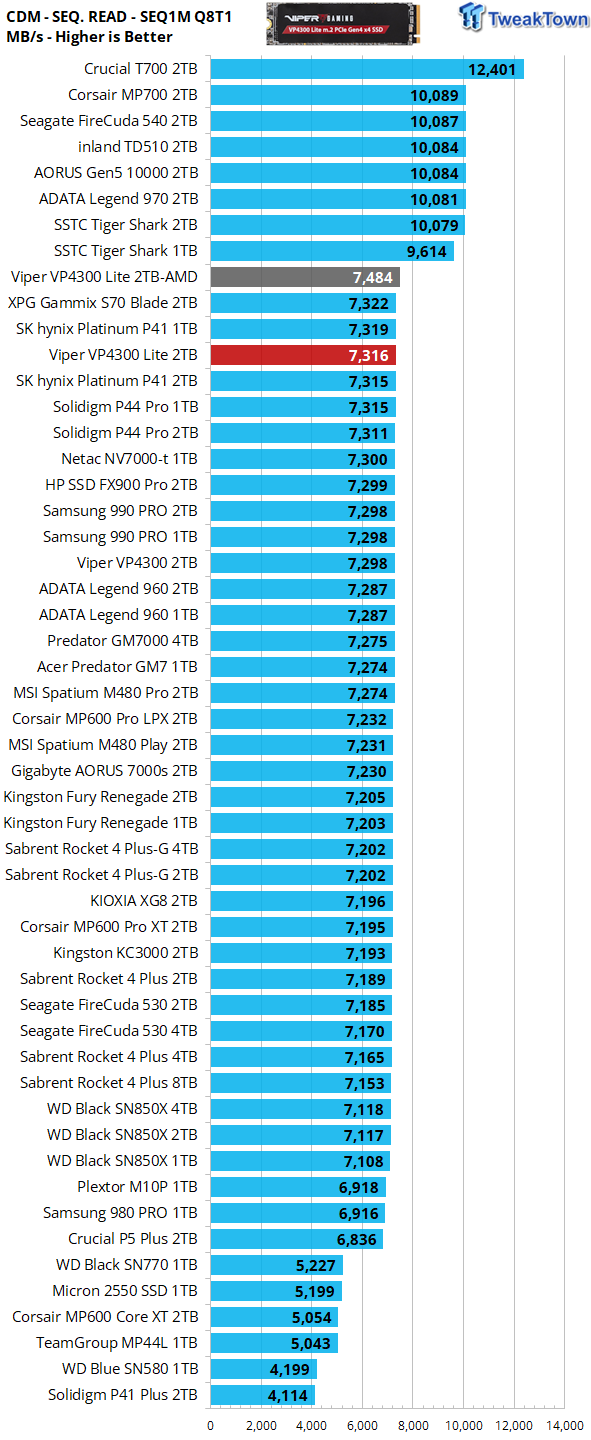
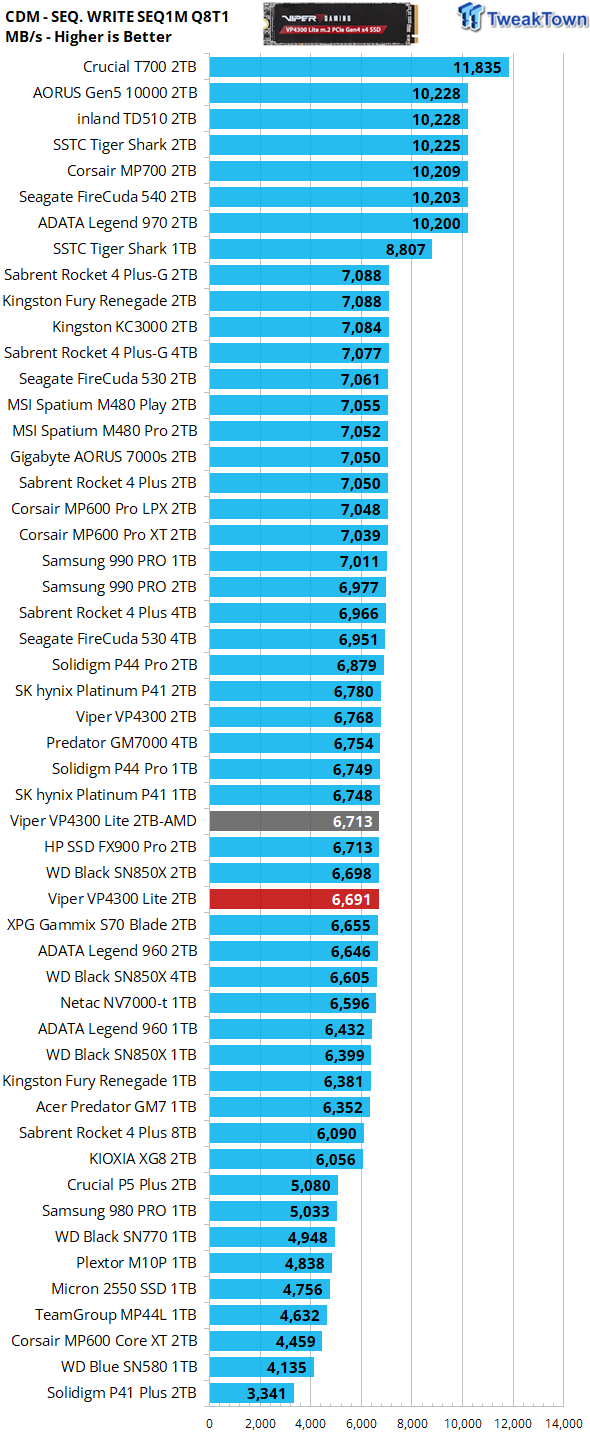
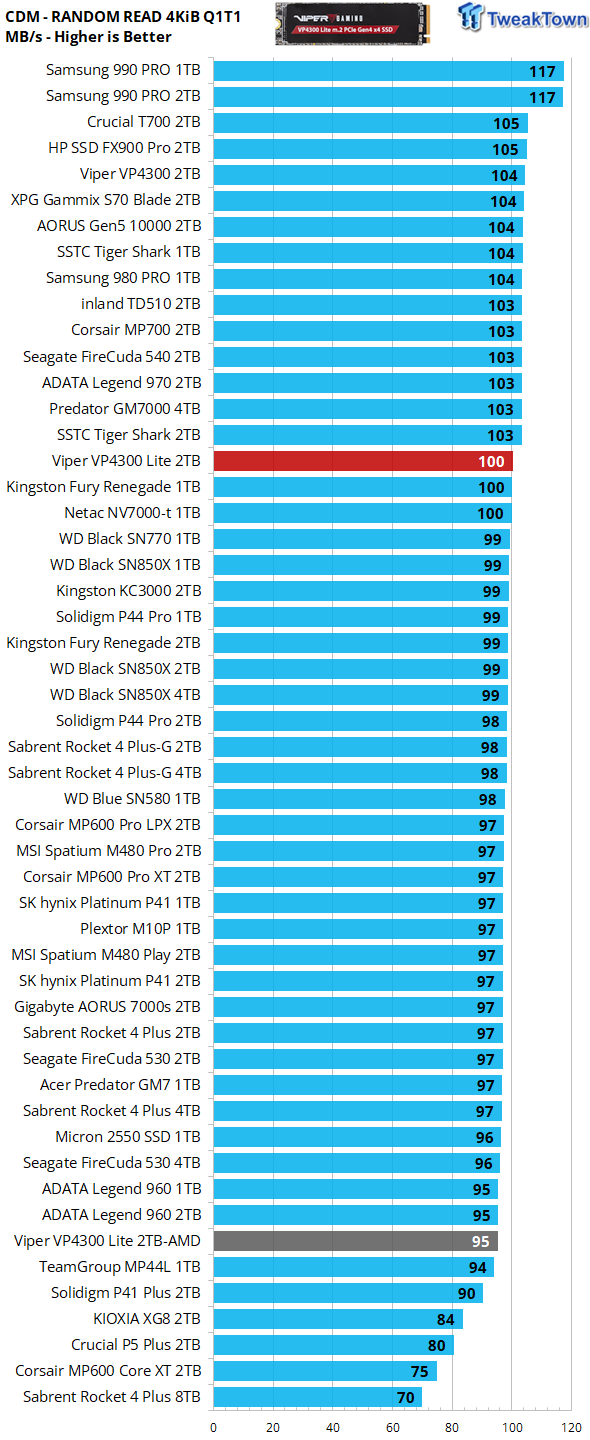
We employ CDM as our standard measurement for both sequential throughput and Q1T1 random read. In terms of sequential throughput, we find our test subject fully capable of meeting and exceeding quoted up to specifications (which are given for AMD). Additionally, looking at the number that typically matters most in terms of real-world performance, 4K QD1 random read, our test subject is delivering exceptionally well at 100 MB/s on Intel and 95 MB/s on AMD, which is an excellent indicator that the 2TB model will in all likelihood deliver performance that is on par with the 1TB version.
Anvil's Storage Utilities
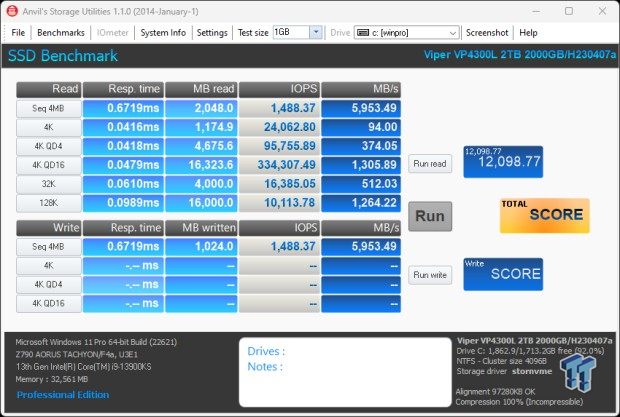
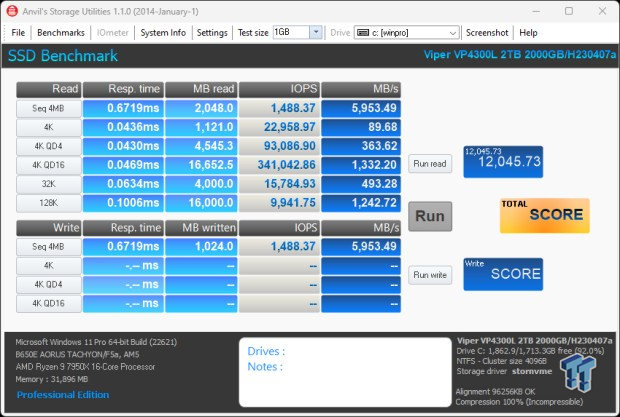
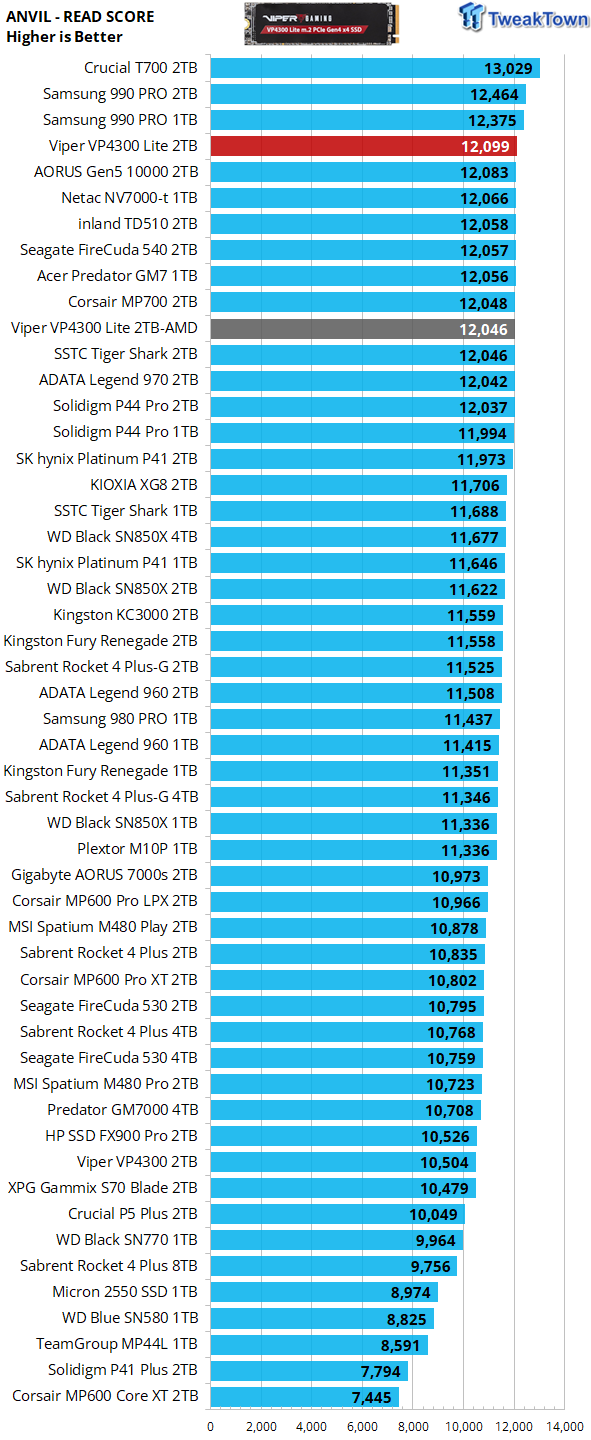
Patriot's DRAMless speedster delivers the fourth-best read score we've ever achieved with a flash-based SSD running on our Intel system. Amazing.
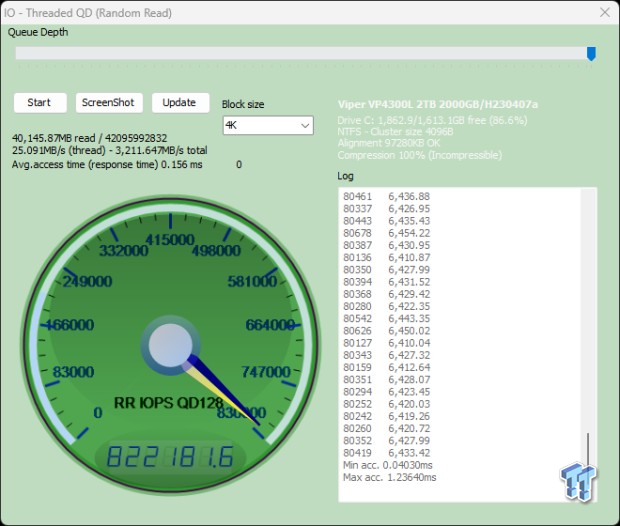
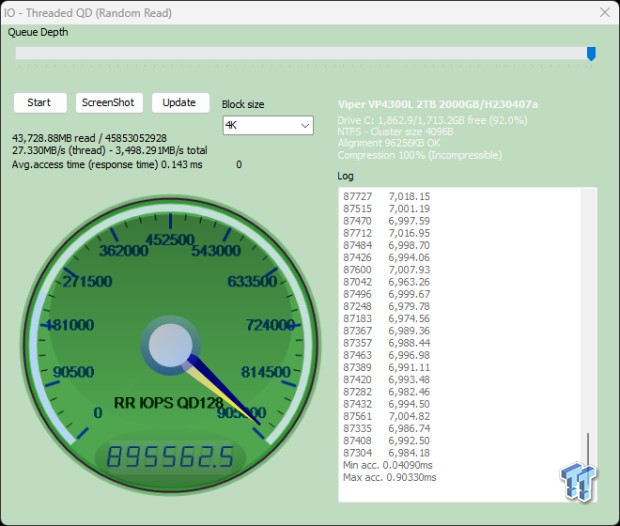
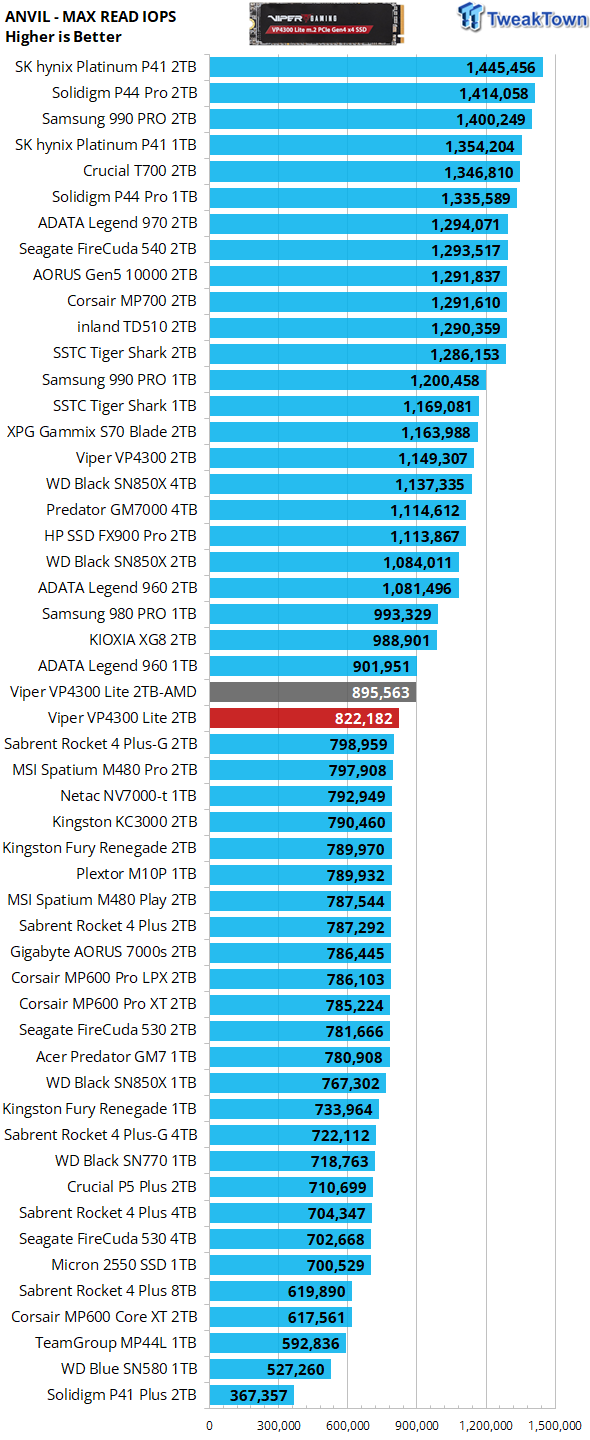
We employ Anvil's random read test as our standard for measuring max random read IOPS. This test is very accurate as it at its core is Iometer skinned over. We test at QD128. Our DRAMless contender cranks out an impressive 895K random read IOPS on our AMD system. Another lab best for any flash-based DRAMless SSD.
ATTO
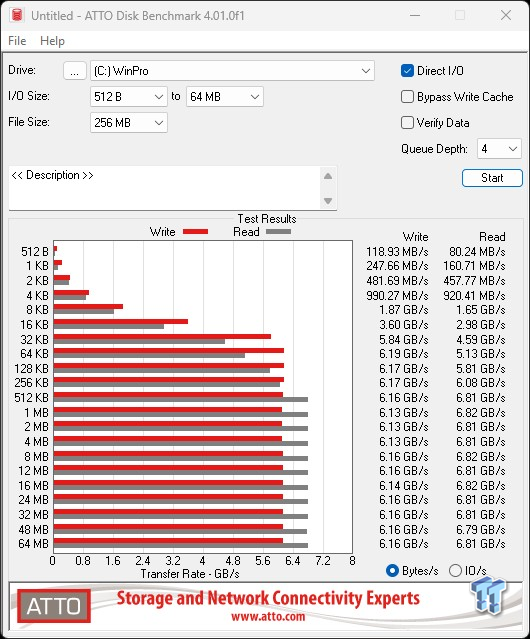
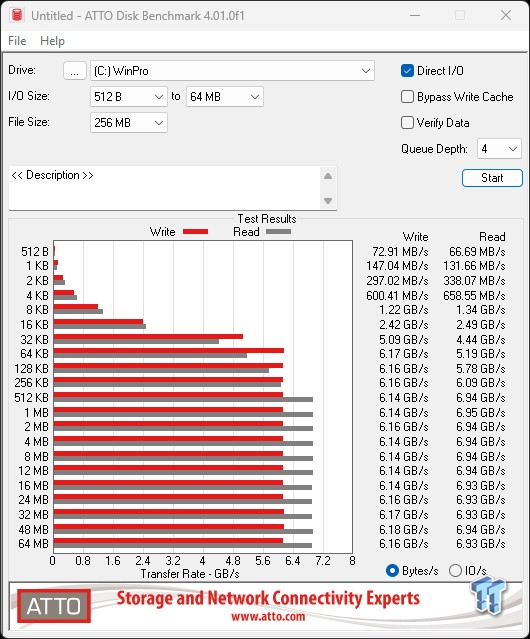
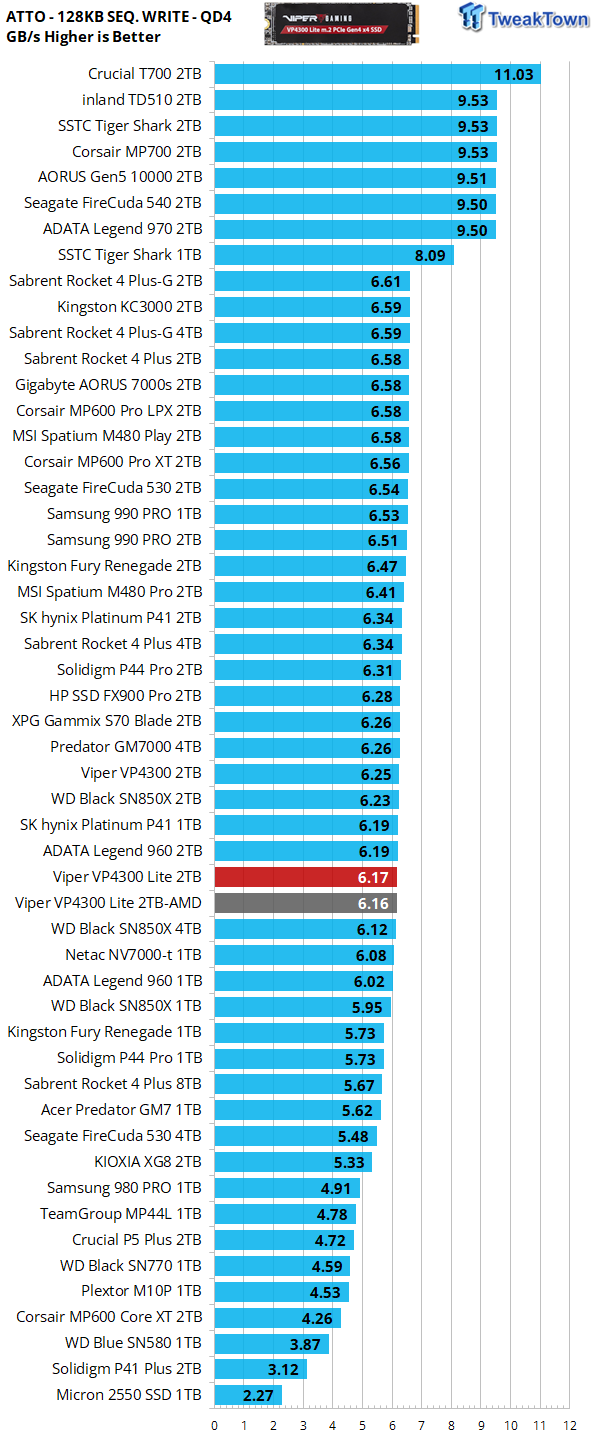
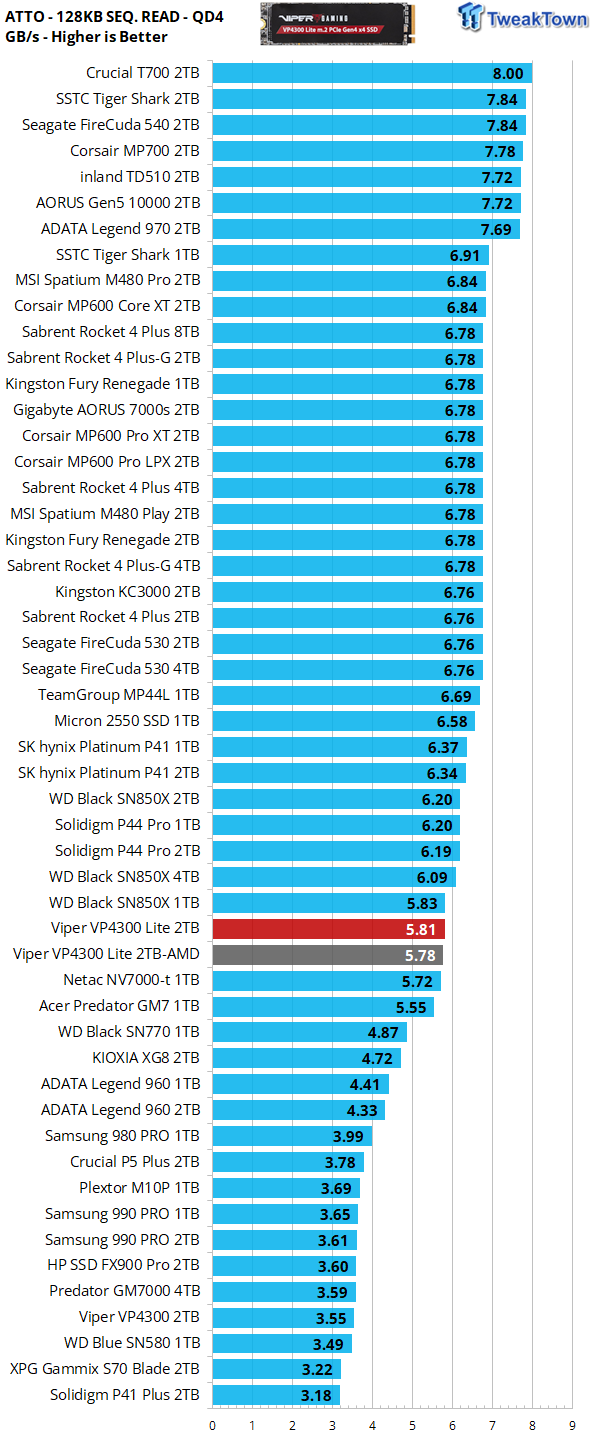
ATTO gives us a clear picture of what transfer sizes a particular SSD favors in terms of sequential throughput. We chart 128K transfers. As expected, our test subject favors sequential transfers of 512K or larger when serving data to the host (reading) and 64K or larger when programming (writing) data.
Real-World Testing: Transfers, 3DMark SSD Gaming Test, PCM10 Storage
Transfer Rates
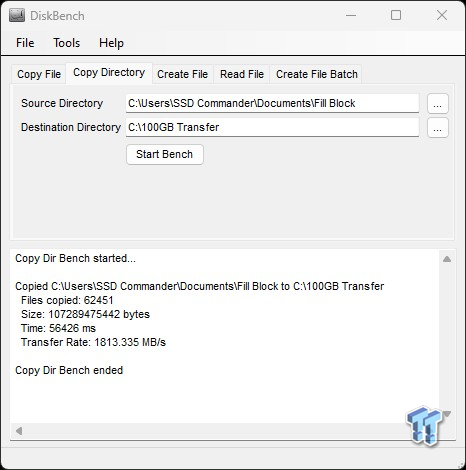
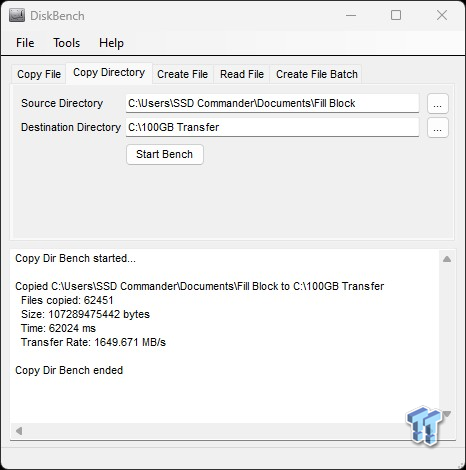
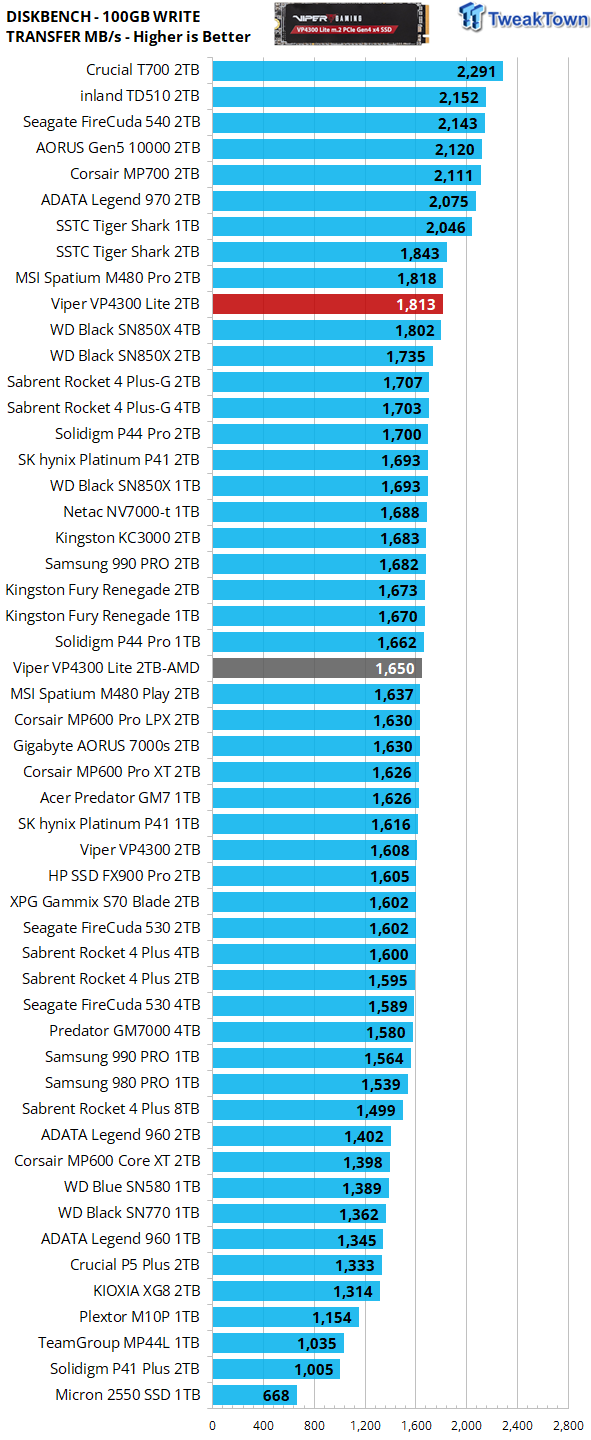
Our 100GB data transfer test is not your ordinary 100GB of data. Ours is a crushing mix composed of more than 62K files. Write performance random or sequential, is an infrequent operation, and as such, we do not consider it to be an important performance metric in the consumer space. An example being how many times is a game installed vs. how many times it's played. Although it's not an important metric in the real-world, we are nonetheless impressed with this new lab record for a flash-based DRAMless SSD.
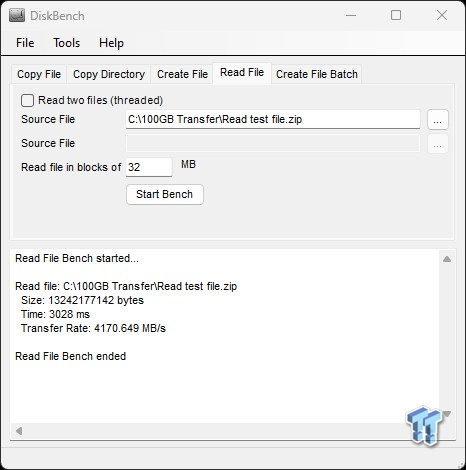
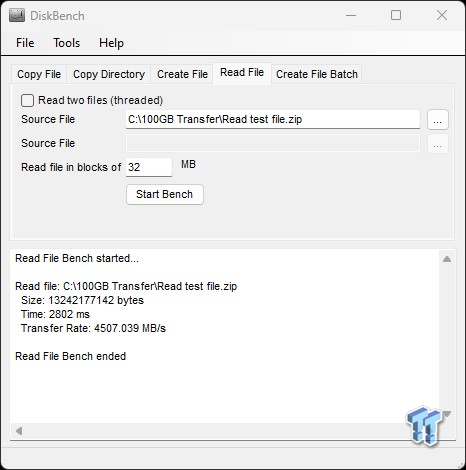
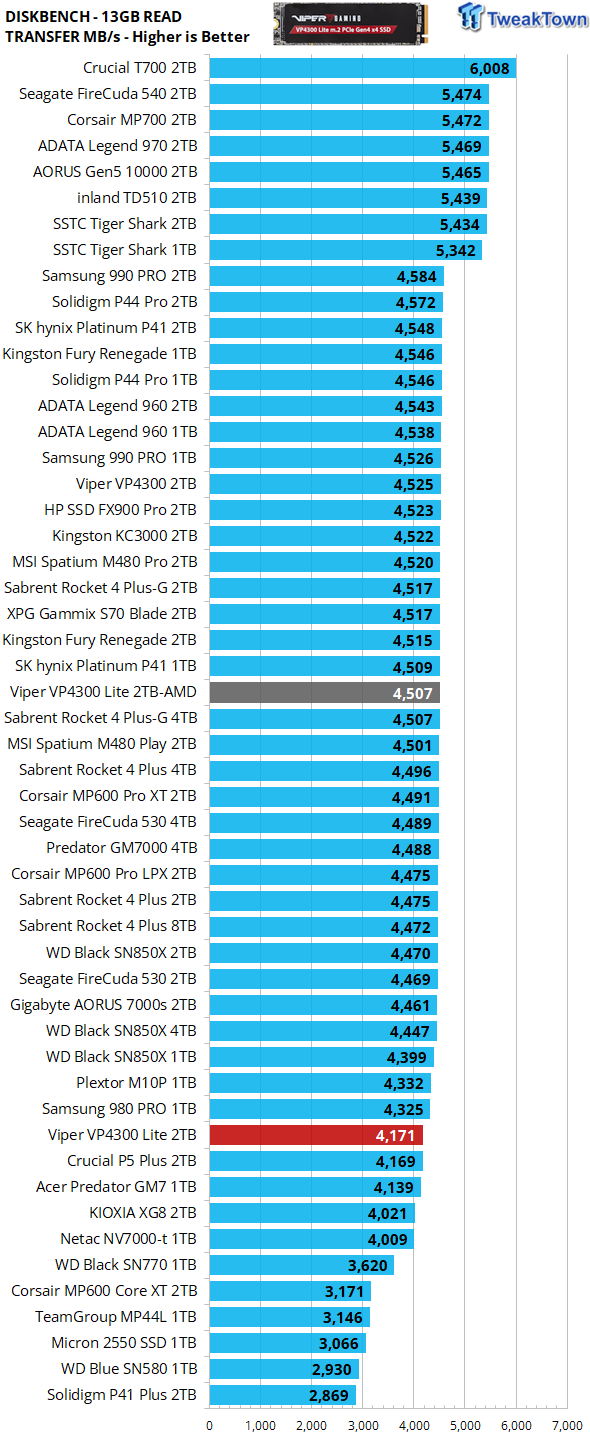
Unlike programming (writing) data, serving data to the host (reading) data is always an important performance metric as it relates to the consumer space. 4,171 MB/s for a DRAMless SSD running on our Intel system - this is once again a record for a flash-based DRAMless SSD. AMD is even better. Impressive.
3DMark SSD Gaming Test
UL's newest 3DMark SSD Gaming Test is the most comprehensive SSD gaming test ever devised. We consider it superior to testing against games themselves because, as a trace, it is much more consistent than variations that will occur between runs on the actual game itself. This test is in fact the same as running the actual game, just without the inconsistencies inherent to application testing. In short, we believe that this is the world's best way to test an SSDs gaming prowess and accurately compare it against competing SSDs. The 3DMark SSD Gaming Test measures and scores the following:
- Loading Battlefield V from launch to the main menu.
- Loading Call of Duty Black Ops 4 from launch to the main menu.
- Loading Overwatch from launch to the main menu.
- Recording a 1080p gameplay video at 60 FPS with OBS (Open Broadcaster Software) while playing Overwatch.
- Installing The Outer Worlds from the Epic Games Launcher.
- Saving game progress in The Outer Worlds.
- Copying the Steam folder for Counter-Strike Global Offensive from an external SSD to the system drive.
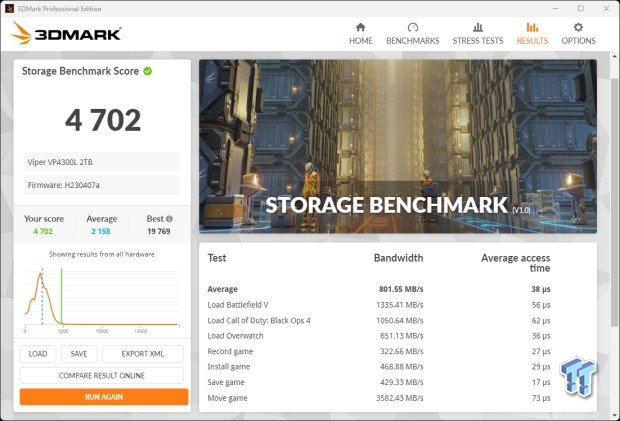
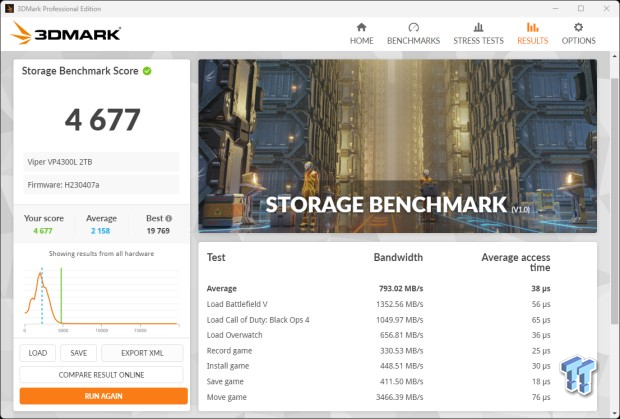
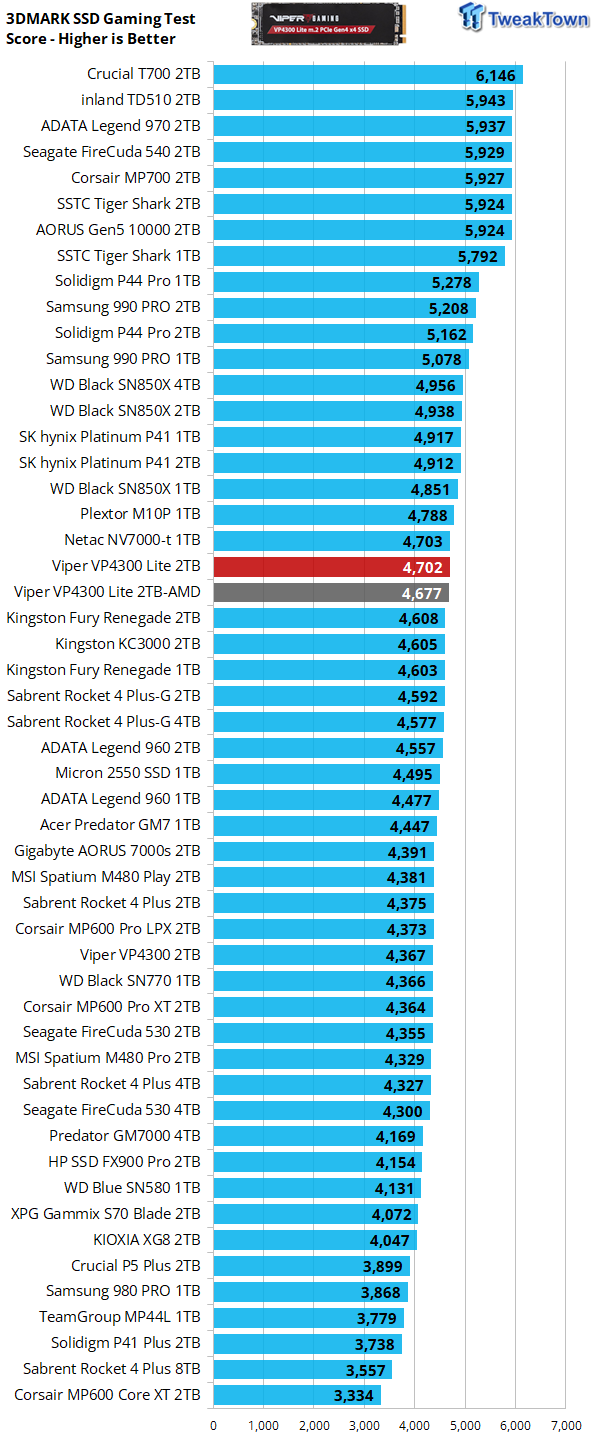
Gaming is a performance metric that matters to the majority of DIY consumers, especially to the enthusiast crowd that TweakTown caters to. Now we've reached the point where results start to matter as they are a direct reflection of user experience. We were absolutely stunned when the NV7000-t delivered a score of 4,703 here, and we are delighted to see our 2TB similarly configured test subject delivers the same here as well. No doubt the 2TB models perform as well as they do at 1TB. Question answered.
PCM10 Storage Tests
PCMark 10 Storage Test is the most advanced and most accurate real-world consumer storage test ever made. There are four different tests you can choose from; we run two of them. The Full System Drive Benchmark and the Quick System Drive Benchmark. The Full System Drive Benchmark writes 204 GB of data over the duration of the test. These tests directly correlate with mainstream user experience.
PCMark 10 Full System Drive Benchmark
This particular test writes 204GB data and covers a broad range of common consumer tasks, including booting Windows 10, file transfers, Adobe and Office applications, and startup times for games, including Battlefield V, COD Black Ops 4, and Overwatch. Unlike synthetic numbers, this is comprehensive real-world data which is why we use it to rank SSDs in terms of user experience.
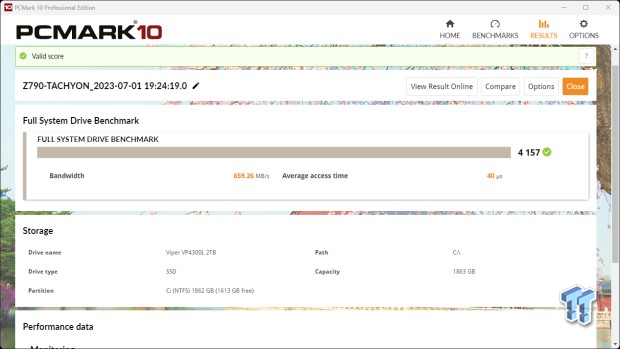
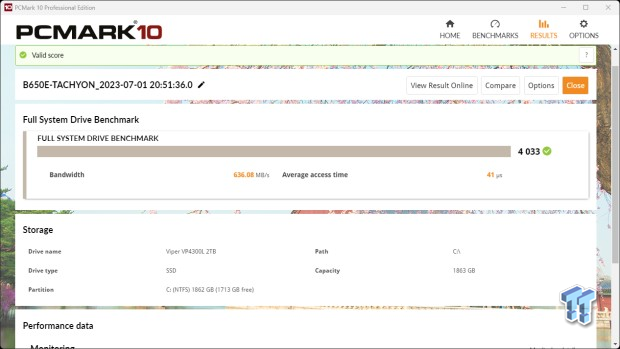
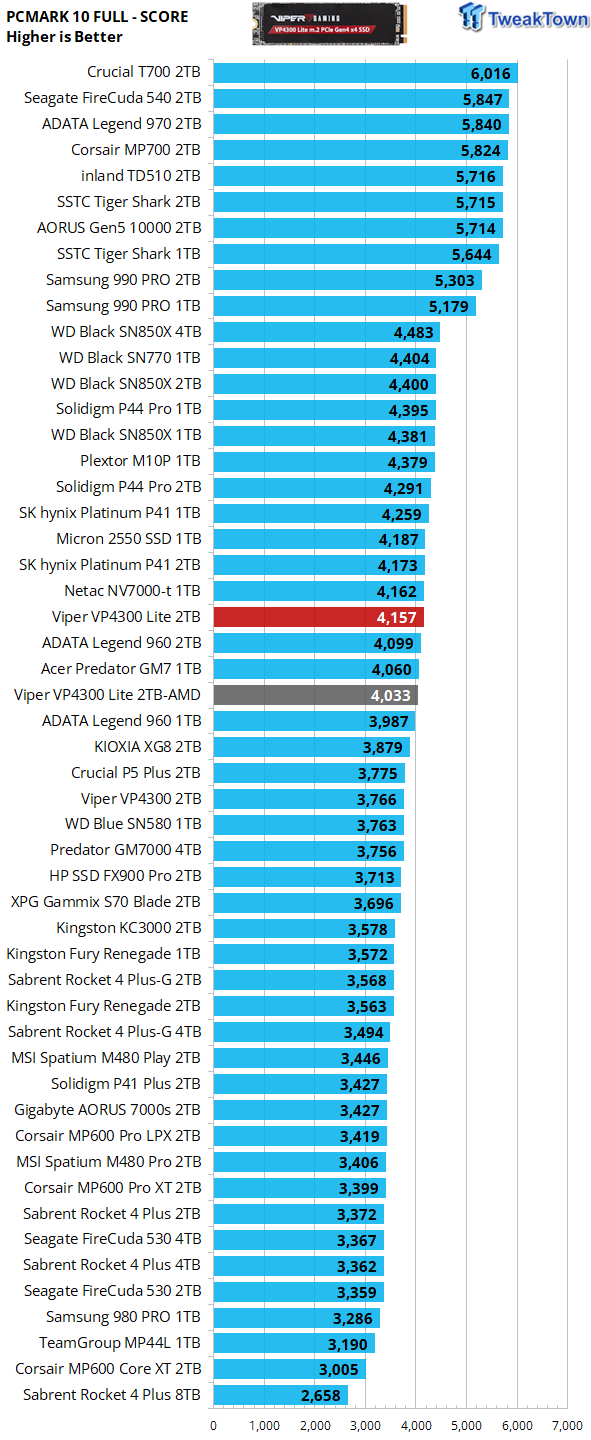
As expected, our test subject handles heavy consumer workloads exceptionally well. This time we are within 5 points of the 1TB NV7000-t, which again verifies this hardware configuration is just as performant as it is at 1TB. Outstanding.
PCMark 10 Quick System Drive Benchmark
The Quick System Drive Benchmark writes 23 GB of data over the duration of the test.
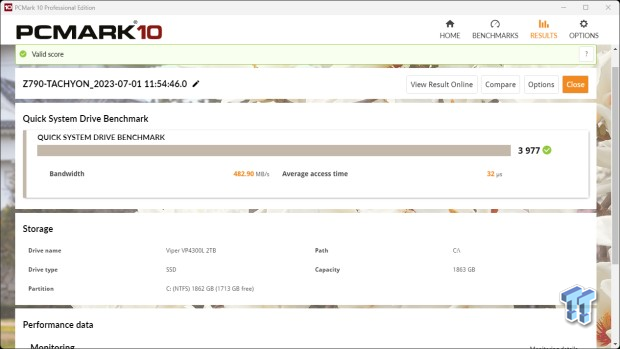
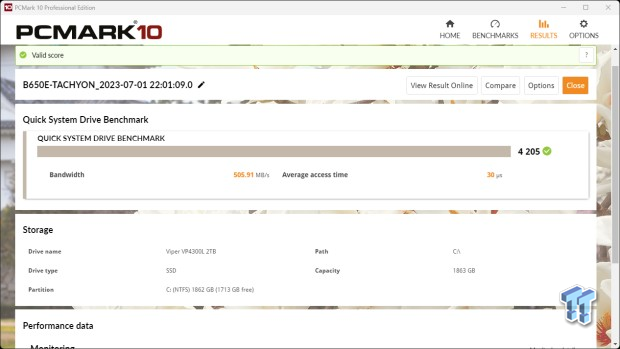
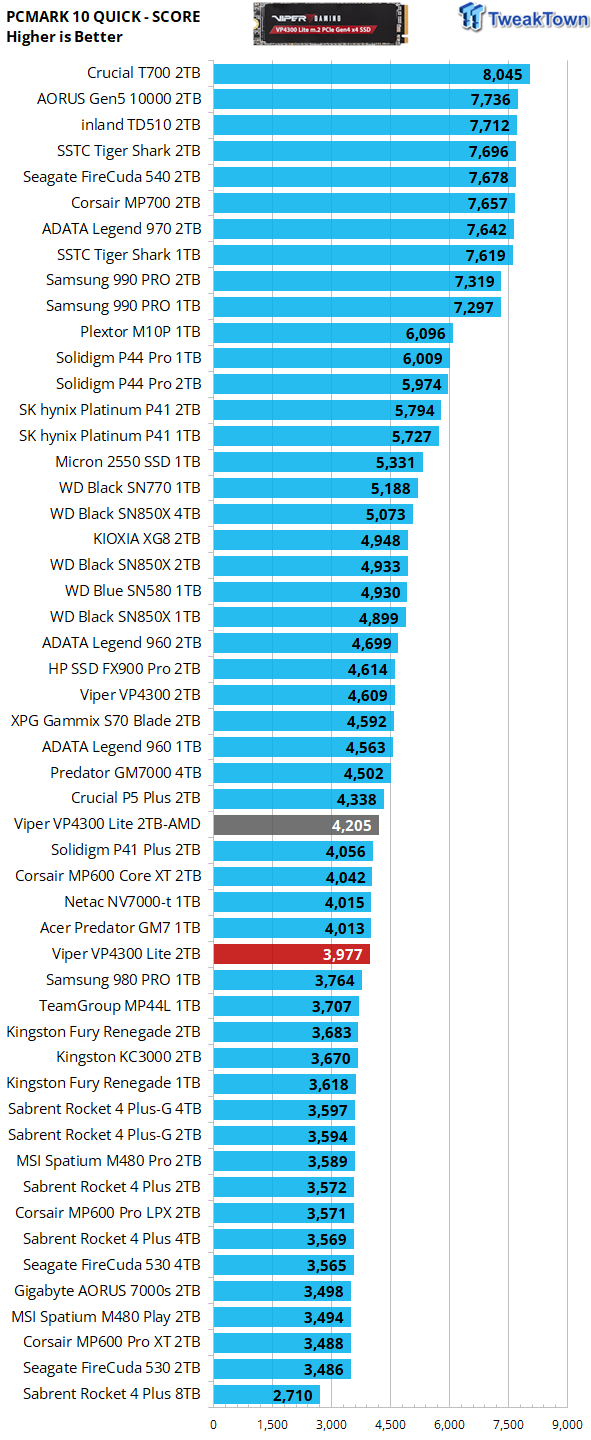
This is the very first time we've ever had our AMD system beat our Intel system at a benchmark where performance matters. Wow.
Final Thoughts
There are very few SSDs that run real-world workloads as good on AMD as they do on Intel. Actually, this is the very first hardware configuration to do so. This speaks directly to the efficiency of this particular hardware configuration. It doesn't matter what you stick one of these in. It will deliver the goods at a very high level. We find this very refreshing indeed.
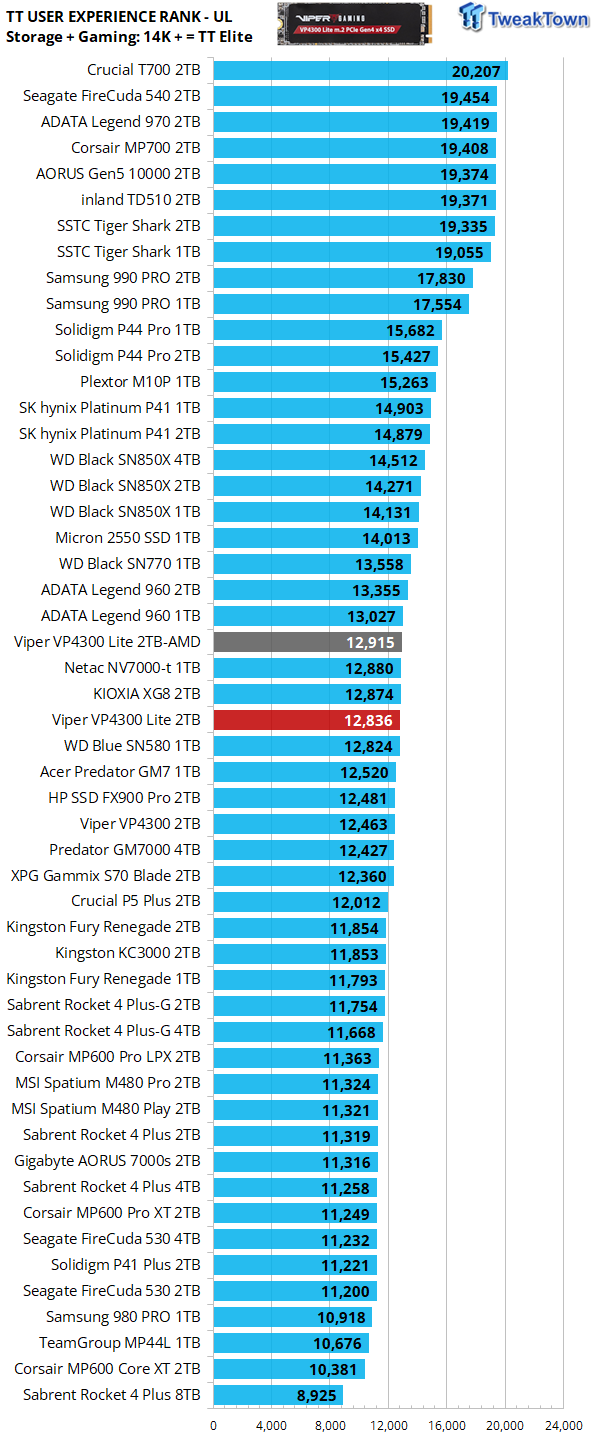
We rank SSDs in terms of overall user experience (performance where it matters most) as expressed by PCMark 10 storage and 3DMark gaming storage tests. We consider a user experience score of 14K or more to verify an SSD as a TweakTown Elite performer. An overall win for AMD? If memory serves us right, that hasn't happened since the Ryzen 3000 Series was the new kid on the block. Mind blown.
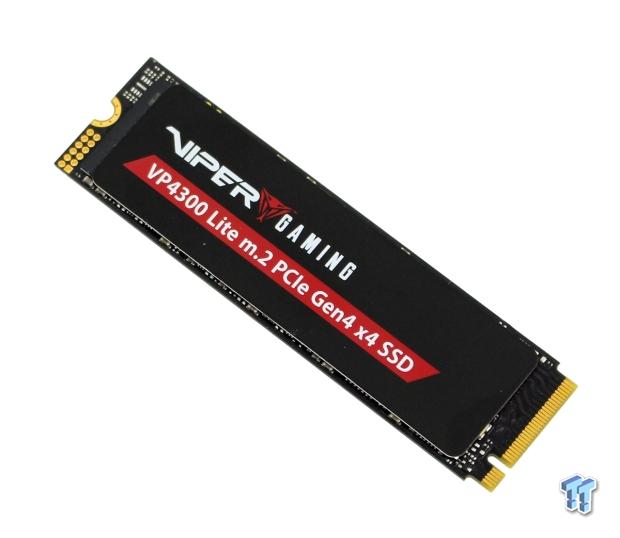
As we see it, Patriot's VP4300 Lite is just incredible, especially at 2TB. We are of the opinion that when all factors like capacity, price point, power draw, real-world performance, and endurance are taken into consideration, the 2TB VP4300 Lite is among the top 5 best consumer SSDs ever made. You do not want to overlook this Best Value product.

